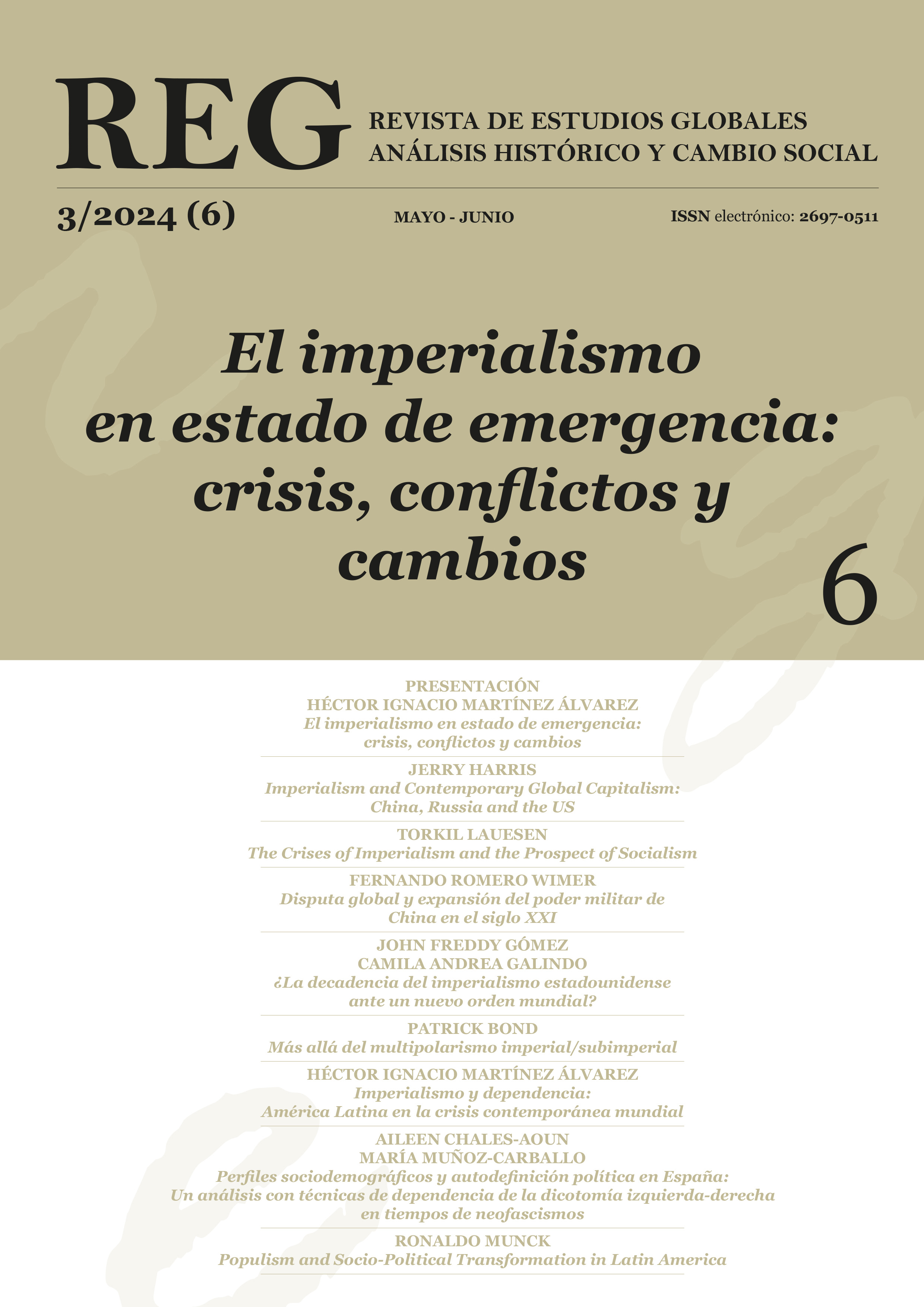Más allá del multipolarismo imperial/subimperial
Resumen
El proyecto “multipolar” aparece para algunos como una alternativa al poder imperialista dominado por Occidente, especialmente a las instituciones multilaterales orientadas a las empresas. Sin embargo, incluso si los países de renta media consiguen entrar en el accionariado formal y la gestión de estas instituciones, es evidente que su exitosa asimilación de los neoliberales del Sur Global representa una asociación imperial/subimperial insostenible. Al fin y al cabo, el contexto para este tipo de acuerdos incluye crisis financieras periódicas (que catalizaron el G20 a finales de 2008), una ralentización del crecimiento del PIB y de la integración económica mundial, una política monetaria occidental sesgada por los banqueros (cuyos tipos de interés más altos están provocando crisis de deuda cada vez más graves), las lecciones de la pandemia del virus Covid-19 sobre la provisión de bienes públicos mundiales (es decir, las restricciones de la propiedad intelectual de las corporaciones sobre las vacunas), el aumento de los precios de los alimentos y el aumento de la pobreza, (es decir, las restricciones de la propiedad intelectual de las corporaciones sobre las vacunas y el tratamiento), el empeoramiento de las crisis ecológicas, la desigualdad extrema, el aumento de las reacciones protofascistas, la agitación geopolítica, la guerra devastadora e incluso un genocidio no mitigado por un orden judicial internacional desaprobador (aunque simbólico). El renovado énfasis en un BRICS+ Brasil-Rusia-India-China-Sudáfrica en expansión puede seguir suscitando falsas esperanzas, especialmente en la “desdolarización” y en el papel de unas cuantas pequeñas instituciones “alternativas”. En su lugar, se requiere ahora un auténtico internacionalismo solidario, ascendente y no polar, para trascender tanto las inútiles asociaciones imperiales/subimperiales como el falso amanecer del multipolarismo de los BRICS+.
Descargas
Métricas
-
Resumen282
-
pdf130
Citas
Amin, S. 2010. Law of Worldwide Value. New York: Monthly Review Press.
Arnold, G. 2006. Africa: A Modern History. London: Atlantic Press.
Arruzza, C. T. Bhattacharya and N. Fraser 2019, Feminism for the 99%. London: Verso.
Bateman, M., P. Bond, L. Lavinas and E. Torkelson 2023. Incoming World Bank President Ajay Banga’s predatory-finance background threatens even more prolific Bank poverty-creation. CADTM, 12 April. https://www.cadtm.org/Incoming-World-Bank-President-Ajay-Banga-s-predatory-finance-background
Batista, P. 2023. BRICS Financial and Monetary Initiatives. 3 October, Valdai Club. https://valdaiclub.com/a/highlights/brics-financial-and-monetary-initiatives/
Bhambra, G. and J. Holmwood 2018. Colonialism, Postcolonialism and the Liberal Welfare State, New Political Economy, 23 (5), 574-587.
Bond, P. 2003. Against Global Apartheid. London: Zed Books.
Bond, P. 2021. Pros and Cons of China’s Roles in Southern Africa.’ In A.M. Vasiliev, D.A. Degterev and T. Shaw (Eds), Africa and the Formation of the New System of International Relations. London: Springer Nature, pp.139-156. https://link.springer.com/chapter/10.1007/978-3-030-77336-6_10
Bond, P. 2022. Leaning on the BRICS as a Geopolitical Counterweight Leads Only to Faux-Polyarchic, Subimperial ‘Spalling’. Journal of World-Systems Research, 28(1), pp.146-152. https://doi.org/10.5195/jwsr.2022.1124
Bond, P. 2023. Les BRICS ou la ‘Schizophrénie’ du Sous-Impérialisme, Alternatives Sud, 30, pp.33-46. https://www.cetri.be/Anticolonialisme-s?lang=fr
Brand, Ulrich, and Markus Wissen. 2018. The Limits to Capitalist Nature. London: Rowman & Littlefield.
Chomsky, N. and V. Prashad 2022. The Withdrawal. New York: New Press.
Financial Action Task Force 2023. Black and Grey Lists. Paris. https://www.fatf-gafi.org/en/countries/black-and-grey-lists.html
Fernandes, M. 2023 Can BRICS lead a wave of assertion from Global South? People’s Dispatch, 21 August. https://peoplesdispatch.org/2023/08/21/can-brics-lead-a-wave-of-assertion-from-global-south/
Gaviyau, W., and A. Sibindi. 2023. Global Anti-Money Laundering and Combating Terrorism Financing Regulatory Framework: A Critique. Journal of Risk and Financial Management 16: 313. https://doi.org/10.3390/jrfm16070313
Gorz, A. 1967. Strategy for Labour. Boston: Beacon Press.
Harvey, D. 1982. Limits to Capital. Chicago: University of Chicago Press.
Harvey, D. 2003. The New Imperialism. New York: Oxford University Press.
Hilferding, R. 1910 [1981], Finance Capital, London: Routledge & Kegan Paul.
Hudson, M. 2023. BRICS De-Dollarization, the Banking Crisis, and Multipolarity. Geopolitics, 30 March. https://www.youtube.com/watch?v=CWQjYAg_M84
Kennedy, R. 2023. WWIII Warning and the Moment the Democrats Became Corrupted. The Rubin Report, 5 November. https://youtu.be/kCYDsAB1_0A?t=2532
Klein, N. 2014. This Changes Everything. Toronto: Alfred A. Knopf.
Klein, N. 2023. Doppelganger. New York: Farrar, Straus and Giroux.
Kothari, M., A. Salleh, A. Escobar, F. Demaria, and A. Acosta (Eds). 2019. Pluriverse: The Post-Development Dictionary, Delhi: Authors Up Front and Tulika.
Lenin, V. 1913. Notes on The Accumulation of Capital. Marxists.org, https://www.marxists.org/archive/lenin/works/1913/apr/rl-acc-capital-notes.htm
Lenin, V. 1916. Imperialism. Marxists.org. https://www.marxists.org/archive/lenin/works/1916/imp-hsc/ch03.htm
Luxemburg. R. 1913, The Accumulation of Capital. Marxists.org. https://www.marxists.org/archive/luxemburg/1913/accumulation-capital/
Marini. R. 1973. Dialéctica de la Dependencia. México: ERA.
Obama, B. 2020. A Promised Land. New York: Crown Books.
Prashad, V. 2023. Burying the Monroe Doctrine. Delhi: Tricontinental Institute. https://thetricontinental.org/newsletterissue/burying-the-monroe-doctrine/
Putin, V. 2022. Speech to the Russian Nation. Moscow, 24 February. https://theprint.in/world/modern-ukraine-entirely-created-by-russia-read-full-text-of-vladimir-putins-speech/843801/
Robinson, W. 2003. Transnational Conflicts: Central America, Social Change and Globalization. London: Verso Books.
Roberts, M. 2021. The Sugar Rush Economy. The Next Recession blog, 21 March, https://thenextrecession.wordpress.com/2021/03/21/the¬sugar-rush-economy/
The Economist 2014. The President on Dealing with China. 2 August. http://www.economist.com/blogs/democracyinamerica/2014/08/economist-interviews-barack-obama-1
The Economist 2019. The Steam has Gone out of Globalisation, 24 January. https://www.economist.com/leaders/2019/01/24/the-steam-has-gone-out-of-globalisation
Tricontinental Institute 2024. Hyper-Imperialism. Delhi. January. https://thetricontinental.org/studies-on-contemporary-dilemmas-4-hyper-imperialism/
UN Conference on Trade and Development 2023. Geneva. Trade and Development Report 2023. https://unctad.org/system/files/official-document/tdr2023ch2_en.pdf
UN Global Fund 2024. About the Global Fund. New York: United Nations. https://www.theglobalfund.org/en/about-the-global-fund/
Van der Pijl, K. 2012. The Making of an Atlantic Ruling Class. London: Verso.
Varoufakis, Y. 2023. Techno-feudalism. New York: Vintage.
Wallerstein, I. 1974. Semi-Peripheral Countries and the Contemporary World Crisis. New York: Academic Press.
Xi, J. 2017. ‘Opening plenary address,’ World Economic Forum, Davos, 17 January. https://www.weforum.org/events/world-economic-forum-annual-meeting-2017/sessions/opening-plenary-davos-2017
Derechos de autor 2024 Revista de Estudios Globales. Análisis Histórico y Cambio Social

Esta obra está bajo una licencia internacional Creative Commons Atribución-NoComercial-SinDerivadas 4.0.










